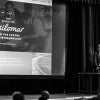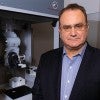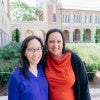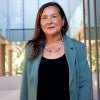
Biotechnology governance entreaties released, echoing legacy of 1975 recombinant DNA guidelines
Twenty-seven biotechnology governance entreaties echoing the legacy of the 1975 recombinant DNA guidelines are now available for public review.

Biotechnology governance entreaties released, echoing legacy of 1975 recombinant DNA guidelines
Twenty-seven biotechnology governance entreaties echoing the legacy of the 1975 recombinant DNA guidelines are now available for public review.

‘Here to work with the world’: Rice shines at inaugural SXSW London
Rice took center stage at the inaugural South by Southwest London, bringing Texas-sized ambition, pathbreaking innovation and global vision to one of the world’s premier gatherings of creative and intellectual leaders.

The Severe Storm Prediction, Education and Evacuation from Disasters Center at Rice, in collaboration with a team of experts, has developed the Galveston Bay Park Plan, an in-bay barrier and park system designed to provide enhanced storm surge protection and navigation and environmental benefits for the highly vulnerable west side of Galveston Bay.

In a new study published in Nature Astronomy, researchers from Rice and the Planetary Science Institute used complex simulations to show that wide-orbit planets are not anomalies but rather natural by-products of a chaotic early phase in planetary system development.

Rice experts equip Houston professionals with AI and machine learning training
Rice experts at the Ken Kennedy Institute who taught an intensive boot camp for data science practitioners and technical managers are available to address questions from the media related to their AI and ML expertise.

Rice to offer Bachelor of Science in artificial intelligence
To prepare the next generation of innovators and thought leaders in AI, Rice will offer a Bachelor of Science in AI beginning in the fall of 2025.

Lydia Kavraki named University Professor, the highest faculty distinction at Rice
In a landmark moment for Rice, renowned computer scientist Lydia E. Kavraki has been named a University Professor, the institution’s highest academic rank. She becomes only the 11th person and the third woman in the university’s 112-year history to earn this prestigious title.

Rice’s Mikos elected to the European Academy of Sciences
Rice bioengineer Antonios Mikos has been elected to the European Academy of Sciences, an international body that recognizes excellence in scientific research and technological innovation.

Recently, a team of scientists and engineers at Rice discovered a phenomenon on a microscopic scale, where tiny magnetic particles driven by rotating fields spontaneously move along the edges of clusters driven by invisible “edge currents” that follow the rules of an unexpected branch of physics.

Forecasters predicting 17 named storms in Atlantic this hurricane season
Experts from Rice are available to speak with the media about hurricane and storm-related topics.

A new wearable removes the guesswork from breastfeeding
While breastfeeding offers numerous benefits for both mother and baby, one challenge has persisted: It’s nearly impossible to know how much milk a baby is consuming.

ENRICH Office’s Health Innovations Symposium showcases Rice-TMC biomedical collaboration ecosystem
Rice’s ENRICH Office hosted a two-day symposium April 24-25 at Helix Park highlighting the encompassing range of biomedical research at the university and the network of collaborations with institutions across the Texas Medical Center.

Pasquali named fellow of The Society of Rheology
Rice’s Matteo Pasquali has been elected a fellow of The Society of Rheology (SoR).

Spotlight from The Franklin Institute Awards Ceremony: Celebrating Naomi Halas
Rice scientist and engineer Naomi Halas was awarded the 2025 Benjamin Franklin Medal in Chemistry May 1 at The Franklin Institute in Philadelphia.

Machine learning powers new approach to detecting soil contaminants
A team of researchers at Rice and Baylor College of Medicine has developed a new strategy for identifying hazardous pollutants in soil ⎯ even ones that have never been isolated or studied in a lab.